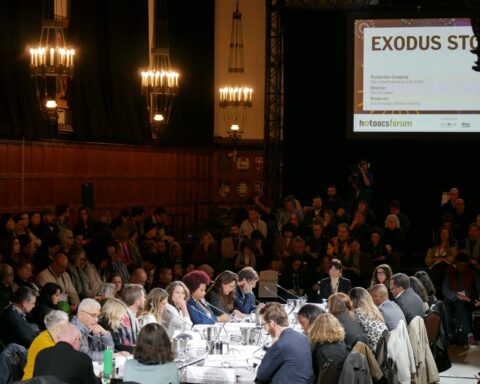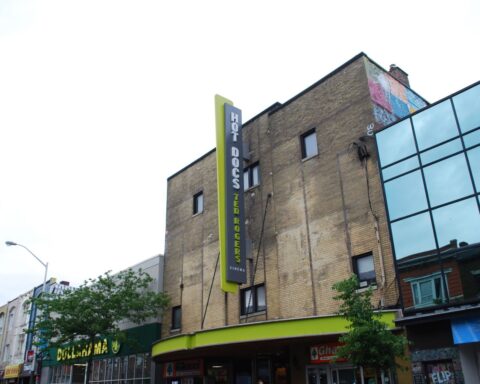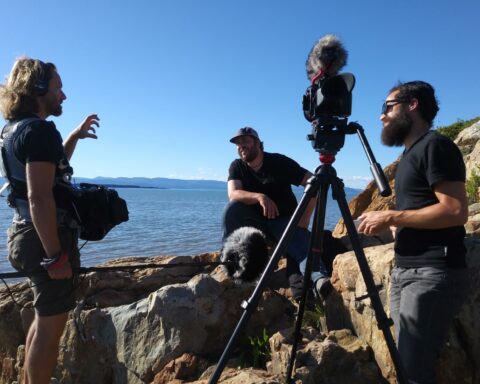It doesn’t take a whole lot of festival cruising to notice that the international documentary industry is pitch crazy. And as filmmakers step into the spectacle ring of head-scratching commissioning editors, their first objective is to make an enthusiastic impression with a solidly informed pitch while the second is to secure enough funding to cover the often-grueling production period of stop-and-go. In recent years, pitching forums have saved the trees and shortened the wobbling stacks of proposals on the desks of industry folks, springing up in every city across Europe and North America where a viable film festival can boost the tourism economy: Munich, Edinburgh, Sheffield, Toronto, Jihlava, Amsterdam, Barcelona, Thessaloniki, Lisbon, Torino, etc. Before entering the pitching forum, most director-producer teams have already mapped the shooting schedule and begun cutting material into a smooth, marketable trailer. Distribution, or the key to spreading their gospel, is often a neglected strategy left until the end of production or even post. Distributors and experts, however, will recommend that a plan be laid out during pre-production, and well before the filmmaker hits the pitching podium.
Festival Screens vs. Theatrical Release
An important distribution strategy is essential to ensure a documentary’s exposure and revenue. The majority of documentary filmmakers dream of having their films bloom to full potential with a theatrical release. Realistically, however, the chances are pretty skinny. In recent years many docs have experienced box office success— Supersize Me, Touching the Void, Capturing the Friedmans, Spellbound, Czech Dream, Road to Guantanamo, Standard Operating Procedure, Man on Wire —but just as ‘big splashes’ encourage other filmmakers to join in the renaissance of doc-making, so does a sense of false hope accumulate amongst the eager auteurs. Even if some filmmakers are fortunate enough to score a theatrical release and gain critical acclaim, often the potential for commercial revenue remains fairly low. And logically, distributors will only invest in a documentary if they foresee an opportunity to recoup their investment through any and all media platforms, which often means using a theatrical release as a DVD marketing campaign or to increase the asking fee of a TV sale.
The key question remains: what sort of distribution do documentary filmmakers hope to reach with their work?
In the traditional past of exhibition and distribution, documentary was nestled in its safe home of film festival circulation—sometimes scooping up awards to raise its popularity—often surviving a limited lifespan that reached only as far as the fest-tour and a broadcast network premiere. Naturally, because documentaries were primarily distributed through film festivals where buyers and distributors stalk the grounds, it has always been crucial for a filmmaker to get his or her film into the circuit. Of course, not every outstanding documentary will get selected for a festival, which means many quality works have been pushed to the wayside.
The Beginning: Doc-Air
But just as digital technology sculpts the aesthetic of documentary, so does its advancements hurtle distribution into new domains. In August 2006, across the sea in the Czech Republic, Doc-Air, an initiative fueled by the Jihlava International Documentary Film Festival (JIDFF), was launched as the first Internet platform of alternative distribution for creative documentaries in the Eastern European region. Their central mandate was to improve the access of an international public to documentary film productions. Whether for educational or entertainment purposes, or as a distributor, festival programmer, film institute or film-buff, the Doc-Air portal offered over 250 films for view or purchase, contributing directly to a broader distribution option for esteemed documentary cinema.
Enter Doc Alliance
All platforms must evolve, and so it was that last spring Doc-Air transitioned to a larger, far-reaching five-headed beast, nobly called Doc Alliance. As a partnership between five key European documentary film festivals—CPH: DOX Copenhagen (Denmark), DOK Leipzig (Germany), IDFF Jihlava (Czech Republic), Planete Doc Review Warsaw (Poland) and Visions du réel Nyon (Switzerland)—Doc Alliance aims to support the distribution of diverse documentaries through lower costs and a shorter bridge between audience, artist and distributors. Doc Alliance’s stated objective is to “create an inventive and dynamic distribution platform for filmmakers and producers by offering attractive alternatives, debates, choices and perspectives.” Quickly, the group launched Doc Alliance Films, a new online portal for both documentary and experimental films, which supports these genres as a yearlong online film festival—minus the booklets, badges and endless schmoozing cocktails that can distract industry professionals from the fly-by-night festival programs.
Criteria
This past July, during the 44th Karlovy Vary International Film Festival in the scenic spa town of the Czech Republic, Doc Alliance organizers were present to demonstrate the platform at an information session, as part of the festival’s ‘Docu Day,’ which generally shows works-in-progress and special screenings. As an introduction to the portal, production manager Jana Ptáčková was adamant about explaining their less-aggressive approach to the distribution industry. “Doc Alliance does not intend to compete with other forms of distribution; we see ourselves as just another option that completely respects other distribution circles.”
Doc Alliance considers themselves distinct from other distribution forms due to their “curated” attitude. Every film offered on Doc Alliance was carefully selected by one of the five festival program committees, with a focus on social and aesthetic value; for a documentary to be accepted by Doc Alliance, it should not only tackle a strong topic, but be artful and innovative. Doc Alliance seeks filmmakers with an inventive approach, an original narrative style or point of view and, according to their website, a willingness to “simulate an open dialogue between the authors and their audience.” The films of Doc Alliance mirror the quality of festival selections, and so a cross-promotion is natural between festivals and filmmakers. As DOK Leipzig director Claas Danielsen says, “If you really want to look for high-quality, artistic author-driven documentaries, this is the right address to go to.”
So what does this mean, exactly? After browsing through Doc Alliance’s catalogue of directors and titles, Danielsen’s promise is indeed fulfilled. The accumulation of internationally diverse docs served on the platform is an invigorating break—especially for North American users—from the top dogs of theatrical release. The portal’s search fields are littered with European titles and directors whose work many of us have browsed in a festival catalogue or industry publication, but perhaps never took the time to investigate further. The database includes talents such as Chris Marker, Boris Mitić, Jennifer Baichwal, John Dower, Jan Gogola, Carlos Hagerman & Juan Rulfo (Those Who Remain), Erika Hníková (I Guess We’ll Meet at the Eurocamp), Timo Novotny (Life In Loops), Mike Hoolboom, Peter Mettler, Ondi Timoner (We Live in Public), Helena Třeštíková (René), Miroslav Janek (Citizen Havel), Jiska Rickels (4 Elements), Karel Vachek, Marko Škop (Other Worlds), Jørgen Leth and Peter Liechti.
Doc Alliance’s curatorial accomplishments will hopefully turn the equivocal and esoteric films from the European crevasses—though perhaps not into household names—at least into moving-picture proof that documentary films can actually ignite the buzzwords called “cultural exchange.”
Currently, Doc Alliance has accumulated over 300 documentaries on its platform, but this doesn’t mean every title has screened at one of the five partner festivals. An average of 20 new films are added monthly, on the basis that each festival partner will select four films, solicited or unsolicited. Although their focus is primarily international contemporary content, with an emphasis on European cinematography, Doc Alliance also curates archival documentaries and a mix between the masters of documentary as well as emerging directors and student works. As a special ‘Event of the Week’ the portal offered free streaming of select films for the duration of the Karlovy Vary IFF, as well as information about all the films that have screened in the festival’s documentary competition in the past years.
Apart from the online portal, (www.docalliancefilms.com), the festival partnership has also formulated an additional platform to ensure the exposure of quality documentaries to the general market and essential industry professionals. ‘Doc Alliance Selection’ will be a touring slice of the online database that includes one outstanding documentary selected by each partner festival. Starting in April, 2010 at Visions du réel Nyon, the five-film showcase will screen at all partner festivals in succession, with a guaranteed presence of national markets to support the docs in their theatrical, TV and DVD distribution. In November during CPH: DOX Copenhagen, an international jury will present one of the films with the ‘Doc Alliance Award.’
Five Festivals
The first stop on the tour is Visions du réel in Nyon, Switzerland. The 15th edition of the festival takes place from April 15th to 21st, 2010. With widespread diversity, the festival exhibits, “committed films, intimate portraits and video art.” Both public and industry gather for one week of screenings, debate and evening events.
In May of 2010, Planete Doc Review Warsaw presents documentaries and thematic sections linked to panel discussions and debate. This festival believes in high-profile film art that can influence opinion, behavior and social change. Planete Doc seeks original style and artistic trends that blend radio documentary, photography and literary reportage.
To open the autumn season, the next festival in line is the Jihlava International Documentary Film Festival, which this year takes place from October 27th to November 1st. For 13 years, Jihlava has been one of the most significant festivals of creative documentary in Central and Eastern Europe. With a motto that states, “Thinking Through Film,” Jihlava IDFF promotes edgy themes with a distinct authorial style and offers a thorough industry guide that incorporates audience discussions, panels, workshops and the East Silver Market. Throughout the year, Jihlava IDFF also works to further support documentary cinema in the region through film screenings with partner cinemas and appearances at other international film festivals.
Overlapping with Jihlava festival, DOK Leipzig, the International Leipzig Festival for Documentary and Animated Film, screens docs for seven days between October 26th and November 1st. DOK Leipzig is one of the foremost international doc festivals in the world with a reputation for being a leading meeting place for the non-fiction industry. Its four competitive categories exhibit the best in new creative and author-driven documentary and animated films. In addition, DOK Leipzig offers their annual retrospective, special programs, workshops and master classes with renowned filmmakers. Every year industry events include: the digital DOK Market offering 300 pre-selected international documentaries, the International DOK Leipzig Co-Production Meeting, the Leipzig Forum on Innovative Non-fiction TV, screenings of new German documentaries for international buyers, and the DOK Summit panel discussions.
The last festival on the circuit is CPH: DOX, Copenhagen International Documentary Film Festival, which runs from November 6th to 11th and is the largest documentary film festival in Scandinavia. The festival typically screens 150 international documentaries, offers five days of professional seminars and hosts the newly founded DOX: FORUM.
How it Works
Any documentary or experimental filmmaker has permission to submit their films through the Doc Alliance Films website simply by completing an online entry form. A DVD copy of the film must then be sent to the central office in Prague. Unlike other portals—for example, the German project ONLINEFILMS.org, where filmmakers upload their films and determine the price—Doc Alliance is a portal of selectivity where films must meet valuable criteria.
The Doc Alliance database can be browsed and filtered by director, country, theme, genre, and keywords. Once a selection has been made, the film is available through three viewing options: streaming, AVI or DVD quality download, with the price ranging from €0.50 for streaming a short film to € 5 for downloading a feature documentary. At the moment, every film on Doc Alliance is available to the five countries of the festival partnership, with the majority of films available to all of Europe and the world. The aim, of course, is eventually to make the entire Doc Alliance database accessible across the globe.
Doc Alliance Films, however, cannot promise the freshest shipment of doc-deliveries—and with the slow-churning rate of doc-making and its public afterlife, the wait seems only natural. The typical circuit of a documentary film by an established director is the usual festival tour, the distribution wheel-and-deal, a possible network broadcast, and perhaps an eventual DVD release. Thus, after a film’s initial premiere, it might take one to two years before Doc Alliance has access to the films of bigger-name directors. In the case of a small film, the process can be much quicker, with a doc finding its way on Doc Alliance Films within six months. “We are simply the next step in the distribution chain,” says Jana Ptáčková. The portal is also proud to boast that it does not ask for any criteria concerning ‘year of production.’ “On the contrary,” says Jana Ptáčková, “we want to prolong the life of documentaries, so naturally we want to make these films available at any time.”
Neo-Distribution
Every filmmaker desires the broadest options and the most freedom on the business end of the industry. When dealing with Doc Alliance Films, the shares are split: 60% to the rights-holder and 40% to the portal. Contracts between filmmakers and the portal are non-exclusive, meaning that a film can be viewed on Doc Alliance Films while having the freedom to screen on other portals.
But if a filmmaker never wants to deal with distributors, buyers, acquisitions—they shouldn’t be persuaded to do so, even by Doc Alliance. A filmmaker always has the option of going it alone. For years, filmmakers like Lance Weiler and Robert Greenwald have been taking advantage of the digital revolution to finance, market and distribute their work, often using their own websites. Filmmakers have the right and the capability to distribute their films online for free and simply ask for a donation or a DVD purchase. Sometimes the money generated from these micro-payments is enough to finance the next project—and it’s more realistic with a documentary, where production budgets are often far less than that of features.
But if you’re a filmmaker that feels safer with a deal and a platform, you can still be a milder revolutionist by investigating alternative distribution routes. And Doc Alliance Films is surely at the forefront of a cultured and digitally-sophisticated revolution.











